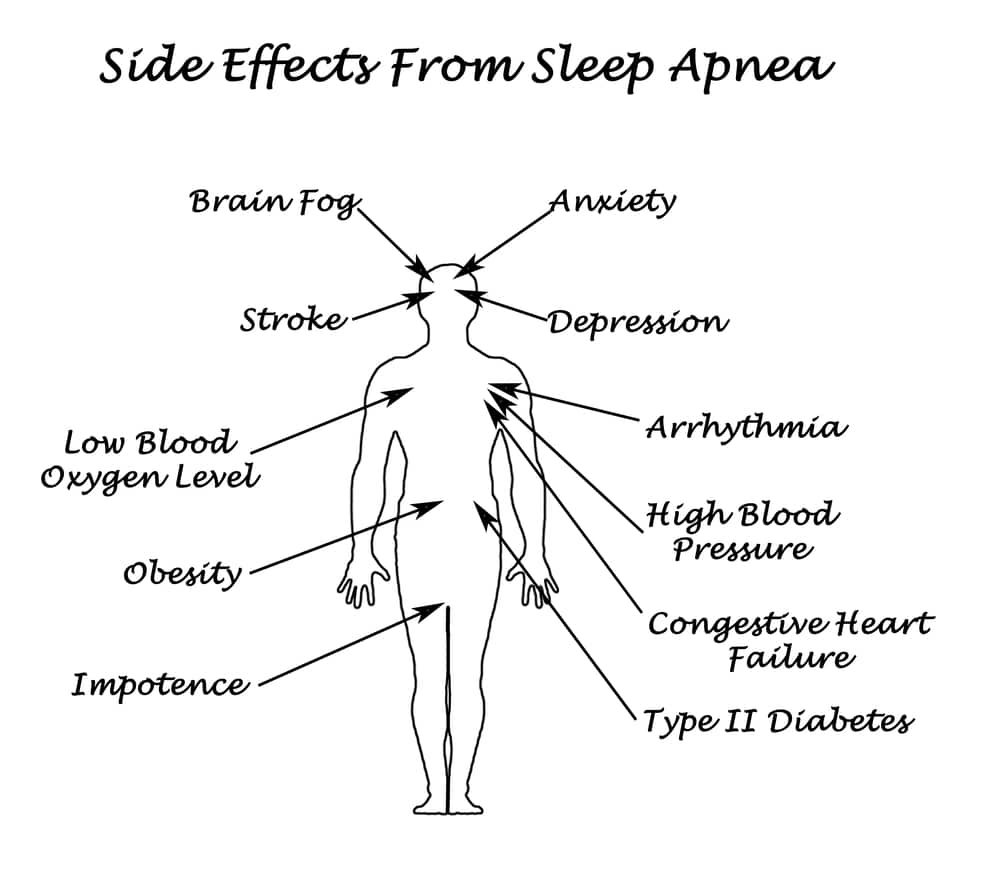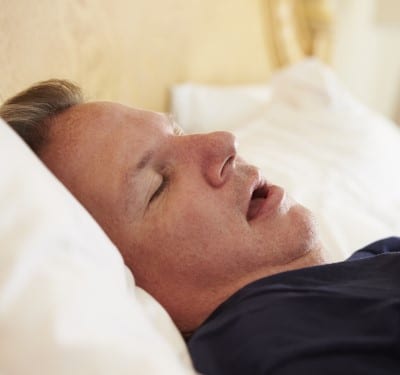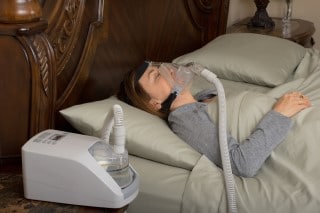
Does sleep apnea reduce life expectancy? – What we know and 10 things you can do
By Jason Wooden, PhD | September 8, 2021
If you’re curious whether sleep apnea can affect life expectancy, it can increase your risk for life threatening health complications and increase your chances for an early death.
Studies have found that sleep apnea patients have 3 times the risk of dying and it can increase the risk of heart attack or dying by 30 percent over a period of four to five years.
The good news is there’s plenty you can do for sleep apnea including sleep hygiene, life style changes, weight loss, exercise, and treatment.
The thing about sleep apnea and life expectancy…
What sleep apnea does to your sleep and how it can ruin your life is bad enough.
Waking up after a miserable night feeling as if you haven’t slept at all, even with 8 hours of sleep…
Morning headaches and stumbling through the day as a sleep-deprived zombie…
It’s no surprise if you’re curious whether sleep apnea can reduce your life expectancy too.
Sleep apnea is one of the most common sleep disorders affecting nearly 1 billion people worldwide to varying degrees.
Obstructive sleep apnea (OSA), the most common type, happens when the muscles in the throat relax too much during sleep. This causes your airway to narrow and restricts the flow of oxygen to the brain.
The reason it’s such a sleep killer is because your brain arouses you out of deep restful sleep into a lighter sleep to get your breathing back on track.
This happens repeatedly even though you’re not awaken.
And that’s why you wake up in the morning feeling as if you never slept.
Much has already been written about all the things sleep apnea can do to the body.
Can it affect your health in other ways including life expectancy?
Let’s take a look at what we know and what you can do about it.
Sleep apnea can increase your risk for life threatening health complications
To understand how sleep apnea could affect life expectancy, you only need to look at some of the serious affects it has on the body.
Besides leaving you incredibly exhausted and mentally sluggish, sleep apnea has been linked to depression and anxiety.

Most people aren’t aware of the other serious health issues it’s been linked to:
Weight gain
Excessive weight gain can increase your risk for a long list of health problems.
It should be no surprise that people with sleep apnea are less motivated to exercise and eat healthy. They’re also more likely to eat at the wrong time due to changes in the hormones that affect how hungry you feel.
Unfortunately, weight gain can make sleep apnea worse.
Heart health
Heart disease is one of the leading causes of death worldwide. OSA has been linked to coronary heart disease, heart failure, stroke, and atrial fibrillation.
Did you know that sleep apnea patients are 2 to 4 times more likely to develop abnormal heart rhythms?
Their risk of heart failure is 140 percent higher and the risk for coronary heart disease is 30 percent higher.
Diabetes
Diabetes is a disease in which blood sugar levels remain too high, affecting almost half a billion people worldwide. Over time, it can damage all sorts of tissues in the body and cause serious problems.
Unfortunately, 1 in 3 people in developed countries like the US are prediabetic.
Did you know that diabetes and sleep apnea are strongly associated with each other?
There’s growing evidence that OSA is an independent risk factor for type 2 diabetes. It’s been linked to insulin resistance, poorer glucose control, and vascular disease.
Dementia
While not immediately life threatening, dementia can take a toll on individuals and their family over time. It’s estimated that by 2030 almost 80 million people worldwide will have dementia.
Severe OSA has been linked in studies to the build up on the walls of the arteries in the brain of the protein beta-amyloid which increases the risk for dementia.
A recent study found that older patients treated for their sleep apnea were less likely to receive a diagnosis of dementia over the next 3 years.
Researchers are still learning about the connections between sleep apnea, poor sleep, and the effects on the body.
One thing for sure is how serious these issues are and what they can do to your quality of life.
Can sleep apnea REALLY reduce life expectancy?
Okay, now we get to what you really want to know – whether sleep apnea can also affect life expectancy and longevity.
I’ve already mentioned the serious health issues sleep apnea can increase your risk for. They’re all things that can cut your life short.
Here’s just some of the research:
A Yale University study found that sleep apnea can increase the risk of heart attack or dying by 30 percent over a period of four to five years.
The researchers also found that the more severe the sleep apnea was at the beginning of the study the greater the risk for heart disease or dying was.
In an 18 year study in Wisconsin, researchers followed over 1500 people and found that people with sleep apnea had 3 times the risk of dying.
Heart-related deaths were 5 times greater in individuals living with untreated sleep apnea.
Taken altogether, this says the answer is yes – sleep apnea really can reduce your life expectancy.
Obviously, just how much it affects your longevity will depend on the severity of your sleep apnea and the specific health issues you’re dealing with.
However, even if it doesn’t kill you, untreated sleep apnea can seriously affect your quality of life.
Other things besides sleep apnea that can affect life expectancy
Since we’ve been on the topic of life expectancy, it should be obvious that sleep apnea isn’t the only thing that affects it.
Some of the other factors that reduce the number of years an individual lives include:
Marital status – married people tend to have lower mortality rates
Lifestyle – factors include diet, physical activity, weight, tobacco and alcohol use, risky behaviors, and vehicle safety.
Genetics – not surprising since your genetics play into many life threatening diseases
Gender – women tend to live longer than men
Socioeconomic status – people of greater social standing tend to live longer
Education – higher education levels are linked to higher socioeconomic status
What to do to keep sleep apnea from reducing your life expectancy
So, it’s not all doom and gloom. There are plenty of things you can do to keep sleep apnea from affecting your life expectancy:

1) Sleep hygiene
Why is this on the list first? That’s because it’s the foundation for good sleep. There’s so many different things that affect how you sleep.
Your everyday habits can make or break sleep. Also, poor sleep hygiene can sabotage the other things you do to treat your sleep apnea.
For better sleep hygiene, you should:
- Wake up and go to bed at the same time every day
- Exercise
- Avoid large meals, alcohol, and stimulants such as caffeine before bedtime
- Maintain a bedtime routine
- Avoid electronics (TVs, tablets, smartphones) near bedtime
- Keep your bedroom dark, cool, quiet, & relaxing

3) Change your sleep position
Did you know that over half of obstructive sleep apnea sufferers have symptoms that are “position-dependent”? Their symptoms are worse if they sleep on their back.
Depending on the severity of your sleep apnea, sleeping on your side instead of your back may help keep your throat more open and improve symptoms. Some people even claim that sleeping upright in a recliner helps.

4) Weight loss
About half of people with sleep apnea are overweight, even a small amount of weight loss can help improve symptoms.

5) Physical activity
Besides helping with weight loss, physical activity is known to promote deeper sleep and there’s evidence it can help reduce sleep apnea breathing disruptions.
So, figure out something that will work for your situation whether it’s swimming, bicycling, jogging, or getting out for a walk. If you’re dealing with other health issues, be sure to check with a doctor so you don’t overexert yourself.

6) Dietary changes
Eating healthier can help with weight loss and keep you from eating foods in the evening that may come back to wreck your sleep.
A low carb anti-inflammatory diet may also help since sleep apnea has been connected to inflammation. (Patients with obstructive sleep apnea, the most common sleep apnea type, have upper airway and systemic inflammation.)

7) Mouth and throat exercises
Various exercises using your mouth and throat may help strengthen your airway and surrounding muscles. This can help the airway stay more open and improve sleep apnea symptoms.
Learn more:
Mouth And Throat Exercises to Help Stop Snoring and Improve OSA (sleepfoundation.org)
Video: Throat exercises for snoring and sleep apnea

8) Sleep counseling
Did you know that counseling is one of the most effective treatments for insomnia and sleep issues? Stress, anxiety, and depression are common causes for poor sleep.
Too often, people develop bad attitudes, habits, and associations that make it harder to sleep.
A specialized type of sleep counseling, cognitive behavioral therapy (CBT-i for short), can help identify and change thoughts and behaviors that affect sleep. Evidence is growing that it can make a difference for sleep apnea patients.

9) Get a check up
If you’re symptoms are serious and ongoing, that’s a good reason to get help, especially if it’s really affecting your life.
Most people aren’t aware how many health issues are linked to poor sleep. There could be other things going on besides sleep apnea wrecking your nights.
Did you know that arthritis, asthma, chronic pain, cancer, diabetes, and heart disease can cause sleep issues? Anxiety and depression are also linked to poor sleep.

10) Get your sleep apnea treated
Sleep hygiene by itself will not cure your sleep apnea, so it’s important to get in and see a specialist to figure out what’s going on and learn about your treatment options.
The good news is that sleep apnea is pretty treatable. Sadly, 80 percent of the patients with moderate and severe sleep apnea are undiagnosed.
Have you tried CPAP and given up? (Some people have a hard time with the mask and CPAP setup.)
Don’t lose hope, there are more options than ever including more user-friendly cpap masks, body positioning devices, neural therapies, and surgical implants.
You may also be interested in:
Why some people die in their sleep, others don’t, and what you can do about it
Is sleep apnea bad? – 5 ways it can wreck your life
9 Things you can try to treat sleep apnea yourself
The Ultimate guide to treating sleep apnea without insurance
Yes, skinny women get sleep apnea too
How to keep sleep apnea from ruining your marriage
The link between sleep apnea and pain
Sources:
1. “Talking Points”, World Sleep Society website
2. “Why does sleep apnea cause weight gain?”, ResMed website
3. Sleep Apnea and Cardiovascular Disease: Lessons From Recent Trials and Need for Team Science, Circulation. 2017 Nov 7;136(19):1840-1850.
4. Epidemiological insights into the public health burden of sleep disordered breathing: sex differences in survival among sleep clinic patients. Thorax. 1998 Oct; 53(Suppl 3): S16–S19.
5. “Worldwide toll of diabetes”, 2019, International Diabetes Federation website
6. “National Diabetes Statistics Report, 2020”, CDC website
7. Obstructive Sleep Apnoea and Type 2 Diabetes, Eur Endocrinol. 2014 Feb; 10(1): 43–50.
8. Obstructive Sleep Apnea and Type 2 Diabetes: Is There a Link?, Front Neurol. 2012; 3: 126.
9. “Dementia”, 2021, WHO website
10. “Link between sleep apnea and increased risk of dementia”, 2020, ScienceDaily website
11. Obstructive Sleep Apnea Treatment and Dementia Risk in Older Adults, Sleep. 2021 Mar 26;zsab076.
12. “Sleep Apnea Increases Risk Of Heart Attack Or Death By 30 Percent”, 2007, ScienceDaily website
13. Sleep Disordered Breathing and Mortality: Eighteen-Year Follow-up of the Wisconsin Sleep Cohort. Sleep. 2008 Aug 1; 31(8): 1071–1078.
14. “9 Factors That Affect Longevity”, 2016, ThinkAdvisor.com
Connect with us:
About Us
Better Sleep Simplified® was founded as a place for you to get clear and well-researched information.
Our goal is to make sure you know about your options so that you take action sooner rather than later.
Check us out on YouTube:
Watch and Learn
Helpful sleep tips, interesting sleep facts and statistics you want to know about
Affiliate Disclosure
This site is a participant in the Amazon Services LLC Associates Program and other affiliate advertising programs designed to provide a means for sites to earn advertising fees by advertising and linking to them.
Important: BetterSleepSimplified.com is for informational purposes only and is not intended or implied to be a substitute for professional medical advice, diagnosis, or treatment. Always consult a physician for sleep and health concerns. See additional information.

